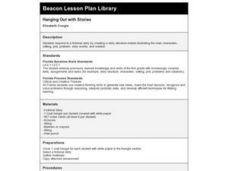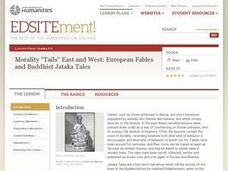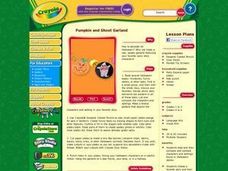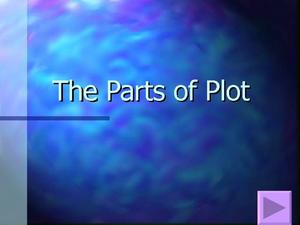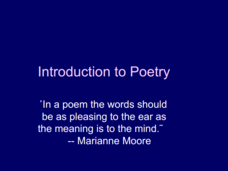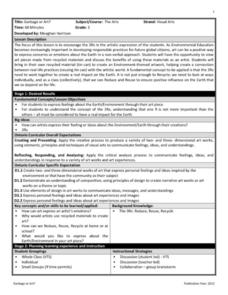Curated OER
Which Story Matches the Given Theme?
Model for young learners how to determine the theme of a story. Read aloud Aesop’s The Fox and the Stork. Chart the plot and the main idea of the fable, showing class members how these elements support the theme. Fable titles for guided...
Curated OER
Hanging Out with Stories
Help your class listen and respond to a fictional story by creating a story structure mobile illustrating the main characters, setting, plot, problem, story events, and solution. Using a coat hanger, they will create an artistic element...
Curated OER
Morality "Tails" East and West: European Fables and Buddhist Jataka Tales
Have your class explore Buddhist Jataka Tales to compare and contrast them to European fables. After defining fables, Jataka tales, and the elements of each, learners identify themes and patterns for both types of narratives and the...
Curated OER
The Tragedy of Romeo and Juliet quiz
Review The Tragedy of Romeo and Juliet with this quick quiz. Operating as an overview of the play, use this quiz to prepare readers for a test perhaps. The questions cover various elements from character foils to the plot sequence.
Lied Center of Kansas
The Ugly Duckling and The Tortoise and the Hare
Both The Ugly Duckling and The Tortoise and the Hare are great additions to an elementary language arts lesson. Young readers focus on the literary elements of each story, including characters and plot development, and apply counting and...
Curated OER
Chatty Cherry Stories
Young artists will respond to reading children's literature, by engaging in original storytelling and representing their own images through the visual arts. Then they orally describe details of people, places, and things in their stories...
Curated OER
Pumpkin and Ghost Garland
Reading scary stories on Halloween is frightfully good fun! As elementary learners read several stories for the holiday, they choose a favorite and create a decorative garland representing the characters and setting elements found in the...
Curated OER
African Music Quiz
Quiz your class on the wonders of African music. There are approximately 25 questions broken into five sections, each section focuses on a different aspect of music applied to African music elements. Quiz topics include African music,...
Curated OER
Comparing and Contrasting Yourself to a Character
First and second graders explore character as a story element. They listen to the first part of the story First Day Jitters by Julie Danneberg and observe the teacher modeling a compare and contrast characters activity. Learners listen...
Curated OER
Thinking About Theme
Writers use the literary element of conflict to develop their theme. Use the conflict between the Johnny and the ScreeWees in Terry Pratchett’s Only You Can Save Mankind to model how a major theme is revealed. The conflict between the...
Curated OER
Writing: Mentor Text Lesson & Microteaching
Mentor texts are a great way to demonstrate how to write with purpose. Pupils will be reintroduced to two well-known books and then asked to think about them from the writer's point of view. They will see that the author had to use basic...
Curated OER
Parts of Plot
Questions are given on each slide of this presentation, asking learners to identify parts of plot. The questions have two answers per slide for readers to choose between, multiple-choice style. The last two slides are labeled "Great Job"...
Curated OER
Plot Rollercoaster
Visualize a plot rollercoaster using this graphic organizer for budding authors. Don't think you're getting the typical five-part plot structure here, though; there are nine spaces for writers to fill in plot elements, assuring they have...
Curated OER
Introduction to Poetry
What makes a poem a poem? Give your class a basic understanding of some of the different aspects of poetry by showing them a slide show of poetic devices and elements. The presentation is quite long, so you might split it up into a few...
Teacherfiles
Plot Graph
Any story can be mapped onto a plot graph. This particular chart includes the mountain shape of a traditional plot graph. Each element of plot is labeled on the page and surrounded by a box to make the words stand out. Learners write in...
Curated OER
Running Out of Time: Concept Analysis
Tap into the information included in this in-depth analysis of Running Out of Time when planning your unit. The document includes a plot summary, analysis of the literary elements in the novel, implications for various student groups,...
E Reading Worksheets
Poetic Devices Finder
Track the poetic elements in any text with a guided reading worksheet. Kids note examples of consonance, alliteration, onomatopoeia, repetition, rhyme, and rhythm when reading a poem or story, and provide a short explanation as to why...
EdHelper
George Washington's Socks by Elvira Woodruff
A solid, straightforward book report form is an excellent addition to your literature unit. Class members note the main characters, point of view, plot elements, and other important details from a story, adding their favorite part from...
University of North Carolina
Poetry Explications
Explication may sound like a fancy word, but it's just a fancy way to say analysis. Using a handout on poetry explications, part of a larger series on specific writing assignments, writers learn how to break down and analyze a poem. The...
Literacy Design Collaborative
Author Study: Kate Chopin
Four stories by Kate Chopin offer high schoolers an opportunity to demonstrate their understanding of the ways authors use various literary elements and movements to develop their themes and social commentaries.
Ohio Resource Center
Clouds
Get your little readers moving with a fun lesson about Eric Carle's Little Cloud. After reading the book together, they engage in a series of locomotor and manipulative activities to illustrate how different elements of the story would...
Curated OER
Writing Diagnostics and Introduction to Literary Terms
Assess your new learners' writing abilities and knowledge of literary terms with these diagnostic activities. Part of a back-to-school unit, this is meant to provide the teacher with information about the ability levels of their class....
Curated OER
Plot and Conflict in W.W. Jacob's "The Monkey's Paw"
Tenth graders analyze the use of literary elements in W.W. Jacob's "The Monkey's Paw." Literary analysis is accomplished by a review of the plot and order of events in the story. Learners work in pairs to match the events from the story...
Curated OER
Garbage or Art?
The three R's are, reduce, reuse, and recycle. Third graders use recycled materials to design and create an environmentally themed piece of art. They discuss and examine major art works that were created using recycled materials, then...
Other popular searches
- Elements of Art Worksheets
- Art Elements
- Elementary Art Elements
- Art Elements Space
- Teaching Elements of Art
- Artistic Elements
- Art Elements of Design
- Five Elements of Art
- Elements of Art Value
- Art Elements and Principles
- Fundamental Elements of Art
- Elements of Art Line



